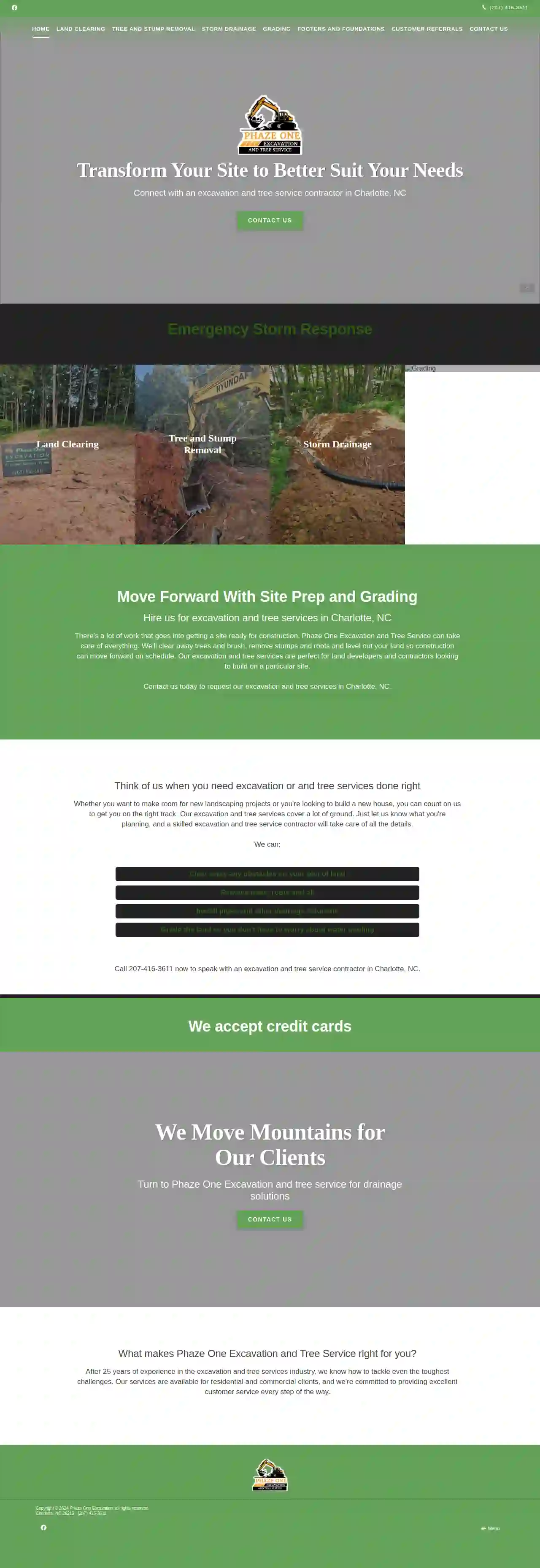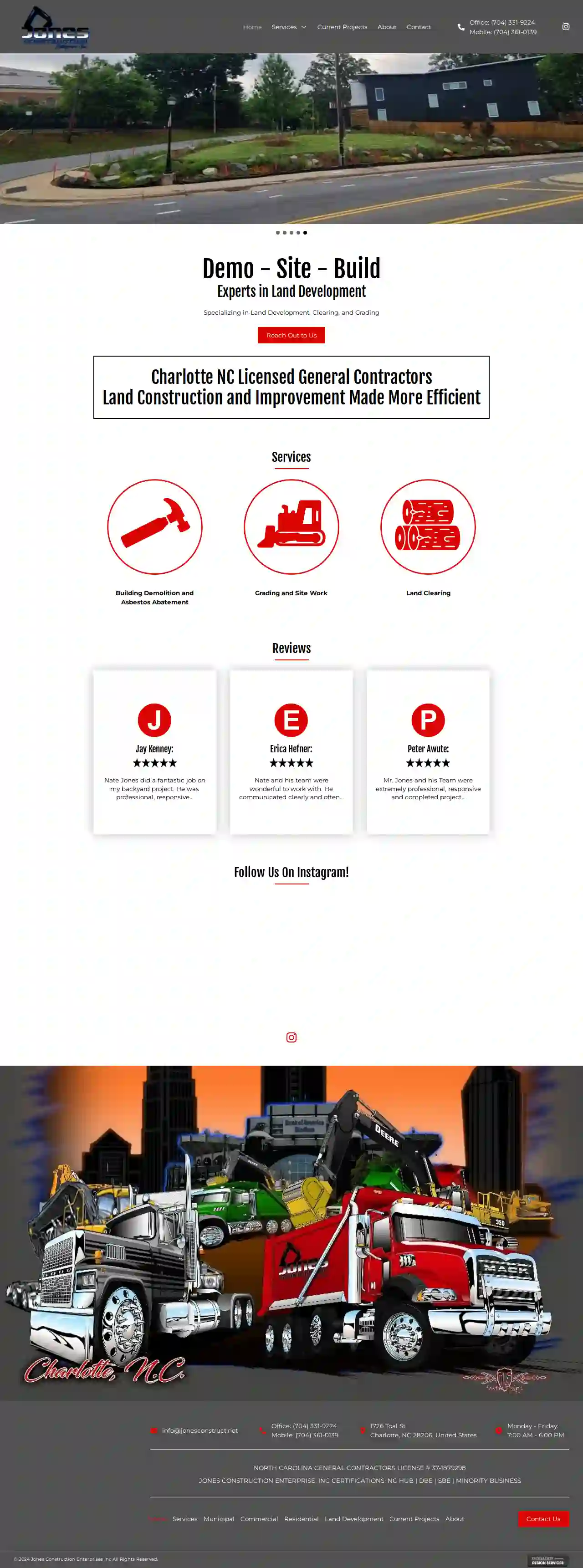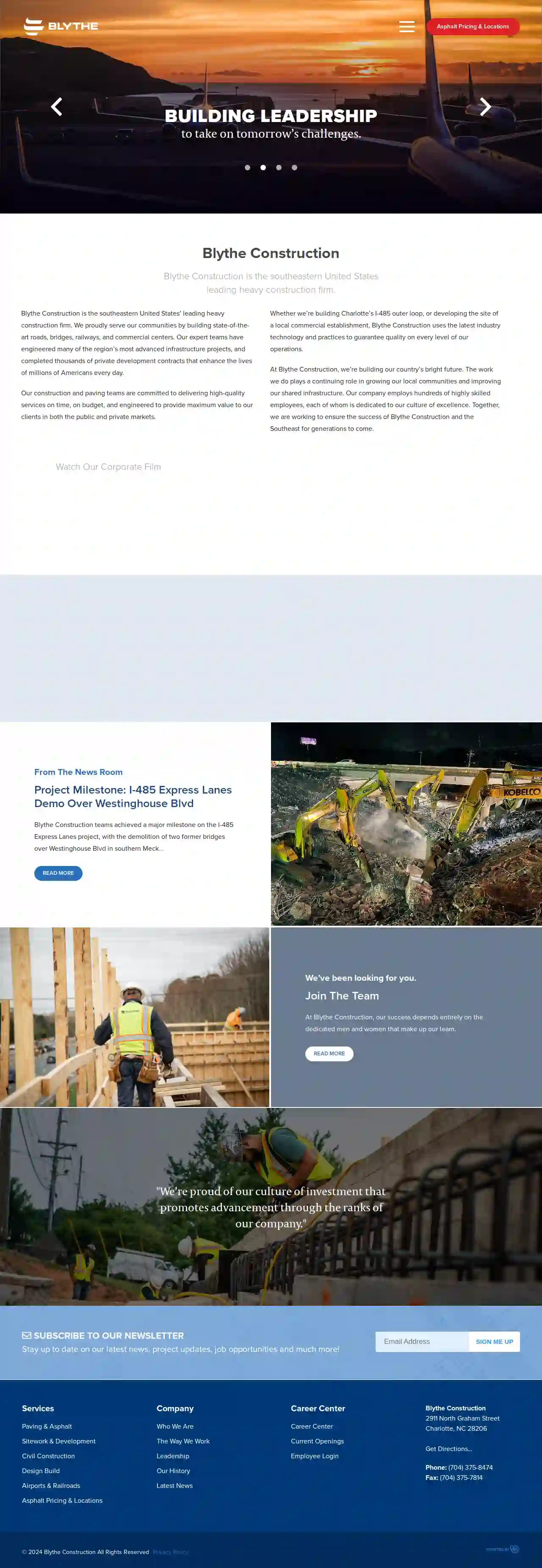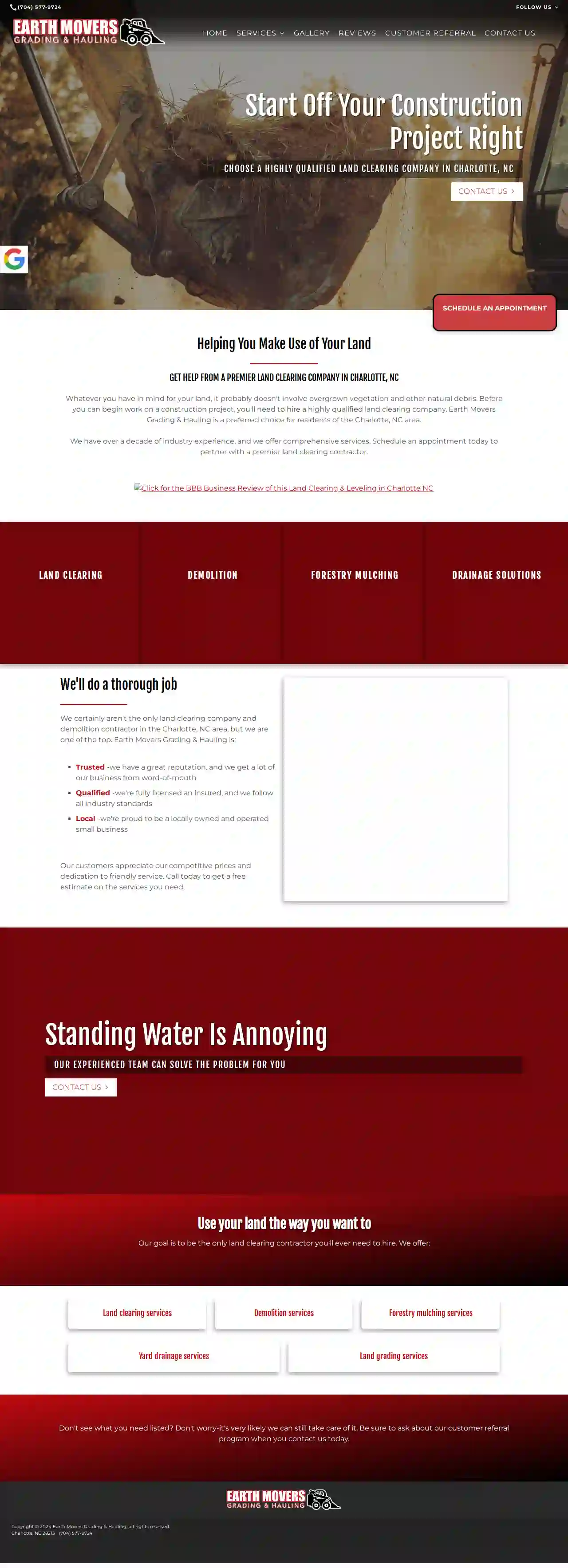Dirt Contractors Charlotte
Top Dirt Contractors in Charlotte
Get multiple Dirt Removal quotes for your project today! Compare profiles, reviews, accreditations, portfolio, etc... and choose the best deal.

Phaze One Excavation
54 reviewsCharlotte, 28213, USTransform Your Site to Better Suit Your Needs Connect with an excavation and tree service contractor in Charlotte, NC There's a lot of work that goes into getting a site ready for construction. Phaze One Excavation and Tree Service can take care of everything. We'll clear away trees and brush, remove stumps and roots and level out your land so construction can move forward on schedule. Our excavation and tree services are perfect for land developers and contractors looking to build on a particular site. Contact us today to request our excavation and tree services in Charlotte, NC. Whether you want to make room for new landscaping projects or you're looking to build a new house, you can count on us to get you on the right track. Our excavation and tree services cover a lot of ground. Just let us know what you're planning, and a skilled excavation and tree service contractor will take care of all the details. We can: Clear away any obstacles on your plot of land Remove trees, roots and all Install pipes and other drainage solutions Grade the land so you don't have to worry about water pooling Call 207-416-3611 now to speak with an excavation and tree service contractor in Charlotte, NC. After 25 years of experience in the excavation and tree services industry, we know how to tackle even the toughest challenges. Our services are available for residential and commercial clients, and we're committed to providing excellent customer service every step of the way.
- Services
- Why Us?
- Gallery
Get Quote
Jones Construction Enterprise's, Inc
4.964 reviews1726 Toal St, Charlotte, 28206, USHire Our Land Developers for Your Next Construction Project Jones Construction Enterprises, Inc. is a full-service construction company specializing in land development, residential, commercial, and municipal projects. We are committed to providing our clients with the highest quality construction services at competitive prices. Our team of experienced professionals is dedicated to delivering projects on time and within budget. We are proud to be a minority-owned business and are committed to providing opportunities for all. Learn More Get a Quote
- Services
- Why Us?
- Gallery
Get Quote
Blythe Construction Inc
3.444 reviewsCharlotte, US- Services
- Why Us?
Get Quote
Earth Movers Grading & Hauling LLC
56 reviewsCharlotte, US- Services
- Why Us?
Get Quote
Over 3,943+ Excavation Pros on our directory
Our excavation providers operate in Charlotte & surrounding areas!
ExcavationHQ has curated and vetted the Best Excavation Contractors in and around Charlotte. Find a reliable contractor today.
Frequently Asked Questions About Dirt Contractors
- Online Directories: Utilize online directories like ExcavationHQ that specialize in connecting homeowners and businesses with qualified contractors. You can filter your search by location, service type, and read reviews from previous customers.
- Referrals: Ask friends, family, neighbors, or colleagues for recommendations based on their experiences with dirt contractors.
- Local Building Supply Stores: Inquire at local building supply stores, as they often have connections with contractors in the area.
- Online Reviews: Check online review platforms like Google My Business, Yelp, and Angie's List for insights into contractor reputations and customer feedback.
- Spring and Fall: Generally considered the optimal seasons in many regions, as the weather is typically mild and the ground is workable.
- Summer: Can be suitable if the weather isn't excessively hot and dry, but ensure adequate watering to prevent soil from drying out.
- Winter: Often challenging due to frozen ground, snow, and potential for delays. However, some contractors may be available for deliveries if conditions permit.
- Plant Selection: Understanding your soil's pH and nutrient levels helps you choose plants that will thrive in those conditions.
- Fertilizer Recommendations: Soil tests reveal nutrient deficiencies, allowing you to apply appropriate fertilizers to meet plant needs.
- Soil Amendments: Identify soil imbalances, such as compaction or high clay content, and recommend amendments to improve soil structure and drainage.
- Construction Projects: Assess soil bearing capacity and other properties to ensure the stability and safety of foundations and other structures.
- Environmental Assessments: Detect potential soil contamination and determine the need for remediation.
How do I find a reputable dirt contractor near me?
What is the best time of year to have dirt delivered?
What is a soil test, and why is it important?
What is the difference between dirt delivery and dirt removal?
Dirt Delivery: Involves transporting and delivering various types of dirt to your location. This could include topsoil for gardening, fill dirt for leveling ground, sand for construction projects, or gravel for driveways.
Dirt Removal: Focuses on excavating and hauling away excess dirt or soil from your property. This is often needed for construction projects, landscaping renovations, or when clearing land for other purposes.
Whether you need dirt brought in or taken out, choosing the right service is essential for your project's success.
How do I find a reputable dirt contractor near me?
- Online Directories: Utilize online directories like ExcavationHQ that specialize in connecting homeowners and businesses with qualified contractors. You can filter your search by location, service type, and read reviews from previous customers.
- Referrals: Ask friends, family, neighbors, or colleagues for recommendations based on their experiences with dirt contractors.
- Local Building Supply Stores: Inquire at local building supply stores, as they often have connections with contractors in the area.
- Online Reviews: Check online review platforms like Google My Business, Yelp, and Angie's List for insights into contractor reputations and customer feedback.
What is the best time of year to have dirt delivered?
- Spring and Fall: Generally considered the optimal seasons in many regions, as the weather is typically mild and the ground is workable.
- Summer: Can be suitable if the weather isn't excessively hot and dry, but ensure adequate watering to prevent soil from drying out.
- Winter: Often challenging due to frozen ground, snow, and potential for delays. However, some contractors may be available for deliveries if conditions permit.
What is a soil test, and why is it important?
- Plant Selection: Understanding your soil's pH and nutrient levels helps you choose plants that will thrive in those conditions.
- Fertilizer Recommendations: Soil tests reveal nutrient deficiencies, allowing you to apply appropriate fertilizers to meet plant needs.
- Soil Amendments: Identify soil imbalances, such as compaction or high clay content, and recommend amendments to improve soil structure and drainage.
- Construction Projects: Assess soil bearing capacity and other properties to ensure the stability and safety of foundations and other structures.
- Environmental Assessments: Detect potential soil contamination and determine the need for remediation.
What is the difference between dirt delivery and dirt removal?
Dirt Delivery: Involves transporting and delivering various types of dirt to your location. This could include topsoil for gardening, fill dirt for leveling ground, sand for construction projects, or gravel for driveways.
Dirt Removal: Focuses on excavating and hauling away excess dirt or soil from your property. This is often needed for construction projects, landscaping renovations, or when clearing land for other purposes.
Whether you need dirt brought in or taken out, choosing the right service is essential for your project's success.